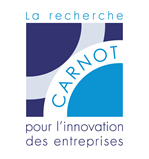Aeronautics Space
The aeronautics sector includes all businesses involved in the design, manufacture and maintenance of civil and military aircraft (i.e., planes, helicopters, drones, airships). The space industry covers the manufacture of all or part of a space system component: spacecraft such as artificial satellites, launchers, etc.
Carnot Institutes strongly involved
Examples of partnerships with companies in the sector
New high-tech vibration absorbers that boost the reliability of sensitive on-board equipment
Partnership Ingenierie@Lyon & Energies du Futur Carnot Institutes - AVNIR EngineeringAVNIR Engineering has carried out experiments to validate innovative vibration absorbers that cater to the needs of the aerospace industry. Mateis lab (Carnot Ingénierie @ Lyon) has developed and enhanced the technological readiness level of a new hybrid material that dampens vibrations when satellites are being put into orbit (a requirement of Ariane Group).
New high-tech vibration absorbers that boost the reliability of sensitive on-board equipment
AVNIR Engineering has carried out experiments to validate innovative vibration absorbers that cater to the needs of the aerospace industry. Mateis lab (Carnot Ingénierie @ Lyon) has developed and enhanced the technological readiness level of a new hybrid material that dampens vibrations when satellites are being put into orbit (a requirement of Ariane Group).
Supporting Innovation
On-board equipment is very sensitive to vibrations and this tends to shorten its lifespan. To compensate for this and avoid having to design oversized structures, we need high-performance vibration isolators or — better still — to integrate the damping function into the structure itself. The INCAS collaborative project, coordinated by AVNIR Engineering, has come up with a hybrid composite that dampens vibrations in the upper stages of future Ariane Espace launchers. It consists of a stiff wire mesh obtained using additive metal manufacturing techniques and filled with a light polymer foam with a damping effect. Thanks to the foam, this material dampens vibrations by a factor of 10 compared with an equivalent module while limiting any increase in mass. Mateis lab, which is part of Carnot Ingénierie@Lyon, has managed to obtain TRL4 validation (on a nine-level technological readiness scale) based on multi-scale characterization of the composite and its constituent elements, and on small-scale, followed by larger-scale testing. The project also enabled AVNIR Engineering to design and build a scale 1 test bed for TRL6 experimental validation of innovative elastomeric and wire rope vibration isolators.
The client needs
The INCAS project has brought together four major groups, four SMEs (including AVNIR Engineering, which heads up the project), and two research labs — Mateis (Carnot Ingénierie@Lyon) and SiMaP (Carnot Energies du futur) — to devise solutions that cater to the needs of four major aerospace corporations especially those of Ariane Group by securing the low-frequency vibrational environments of satellites on future launchers. Dampening low-frequency vibrations (i.e. 5 Hz - 100 Hz) on satellite launchers is key to mission success and, in order to comply with all specifications and limit the number of iterations, structures have now become far too big. AVNIR Engineering, an SME with around fifty employees, tasked with experimentally validating the damper systems on an operational demo, devised and conducted validation testing of the vibration isolators developed in the frame of the project. Moreover, to ascertain the process engineering potential of the new hybrid composite material, characterization testing performed by Mateis indicated a technological readiness level of TRL4. This is the first step in the tricky process of integrating the vibration damping function into the components of satellite launchers themselves.
Partnership
Mateis (Carnot Ingénierie @ Lyon), part of INSA Lyon engineering school specialised in materials science, provided AVNIR Engineering with all of its expertise in analysing the microstructure and mechanical properties of composite materials. Mateis also modelled the innovative co-continuous hybrid material, composed of an open wire mesh structure filled with a lightweight polymer foam whose damping properties comply with Ariane Group technical specifications. Mateis came up with the materials for the wire mesh structure and foam while SIMaP (Carnot Energie du futur) harnessed all of its expertise in Electron Beam Melting 3D printing and in the architectural design of the metal structure.
Thanks in part to a joint thesis conducted by the two research labs, this fruitful venture has come up with a new material whose vibration damping performance has been validated (i.e., at TRL4 level) by larger-scale testing. Moreover, scale 1 benchmark testing has enabled AVNIR Engineering to demonstrate the TRL6-level damping properties of the vibration isolators. The results of all of these different tests have convinced Ariane Group programme managers of both the usefulness and the technological readiness of the solutions in question.
A connected washer providing contactless control over nut tightening in aero engines
Partnership Carnot Cetim - JPB SystèmeJPB Système has teamed up with Cetim to meet the needs of the aeronautical industry by reducing the time aircraft need to spend on the ground checking that nuts are properly tightened.
A connected washer providing contactless control over nut tightening in aero engines
Supporting Innovation
Significant progress has already been made in contactless control over nut tightening in the nuclear industry and rail transportation in a context of vibrations and sharp changes in temperature. However, in the aeronautical industry, JPB Système is pioneering a similar solution for aircraft engines that combines simplicity, speed and accuracy. The company, which is already a leader in self-locking nuts, has leveraged its in-house operational expertise of the Internet of Things (IoT) to come up with a connected washer that is resistant to electromagnetic interference and displays the required torque in just one second. Measurement accuracy to within 6% may be obtained from 10 cm away, whereas an operator using a traditional method achieves 10% at best. Such performances significantly reduce the time for which aircraft are out of action performing checks on their engines.
©Cetim
The client needs
JPB Système is a young family-owned business, created specifically to come up with secure nut tightening solutions for leading aero engine manufacturers. Beginning in 2009, the SME began innovating and robotizing its production processes and making them self-adaptive by harnessing technology such as the Internet of Things (IoT). Its ability to rapidly turn out a range of customised, affordable fixing or sealing solutions has allowed the business to grow rapidly and move into the international market. To come up with a solution that provides quick and accurate contactless checks over nut tightening, JPB Système’s teams leveraged all their experience of the IoT as well as acquiring new expertise. In particular, strain gauges were inserted into washers in partnership with the Carnot Cetim mechatronics resource centre. The Company was able to harness all of Cetim’s human and technical resources to prove the effectiveness and performance levels of its connected washers. Aside from technological considerations, Cetim was able to tap into JPB Système’s corporate DNA by helping to maintain the degree of responsiveness to, and the fit with end user needs.
Partnership
The Carnot Cetim Institute partners businesses in the mechanical engineering sector, particularly where a high level of mechatronics expertise is required. Mechatronics incorporates the electronic systems that are so indispensable to the intelligence embedded in mechanical engineering equipment. These can then be linked to service functions. This mechatronics expertise has enabled Cetim teams to partner the development of a washer that actually helps to mechanically tighten nuts. In particular, to measure torque, it was necessary to produce a machined test body to position the strain gauges while integrating the communication device. The reader developed by the JPB Système teams is installed on a laptop placed a few centimetres from the nut. The screen takes just one second to display the axial tension measured by the washer, which is remotely powered by a passive system to eliminate all electromagnetic interference. A first 12 mm diameter washer was presented at the 2019 Salon du Bourget trade fair. Over the coming months, work will be performed to optimise the electronic systems and enable the partnership to market washers of different diameters. JPB Système is meeting the challenge of measuring required torque at any given time for one of its customers.
A new surface treatment to meet aerospace industry requirements
Partnership Chimie Balard Cirimat Carnot Institute - Mécaprotec
Supporting Innovation
The Zinc-Nickel process enables to protect against corrosion surfaces subject to high stress, particularly in the aerospace sector. The usual method, which is based on the use of products that have a high degree of toxicity, such as Cadmium and Chromium, had to be replaced for compliance with applicable international regulations. Many years of research have been necessary to develop a new type of environmentally-friendly electrolyte. Mécaprotec today is in possession of a unique process recognised by leading aircraft manufacturers worldwide where the benefits compel for competitive advantage and revenue increase.
The client needs
Mécaprotec Industries is a Toulouse-based medium-sized business of 400 employees facing fierce competition and growing demand from manufacturers. Committed very early to a programme of environmentally-friendly improvements, Mécaprotec Industries have developed from a supply-based business to a proactive-based ‘prescriber-advisor’ [OU from an executor to an experienced innovator]. By soliciting a Research partner Mécaprotec has succeeded in developing its own exclusive process, opening access to foreign markets while meeting the highest standards of the most demanding industries. Beyond the commercial dimension and the posting of regular growth in revenues Mécaprotec continues to collaborate with Research centres, thus ensuring successful strategy in terms of, innovation combined with the flexibility and responsiveness of a human scale company.
Partnership
The Toulouse-based Inter-university Material Research and Engineering Centre (Centre Inter-universitaire de Recherche et d'Ingénierie des Matériaux, Cirimat) is part of the Chimie Balard Cirimat Carnot Institute. Its team of researchers work on the design, development, characterisation and study of basic physical-chemical properties and other ceramic, metal or polymeric materials in usable conditions. Cirimat contributions to the Zinc-Nickel process development has been essential for determining the new electrolyte formulation without altering the resistance characteristics treatment. A key to successful Research and knowledge transfer, yet another example of the Carnot Institute’s commitment to its local industrial partners on a large variety of skills and tools.




